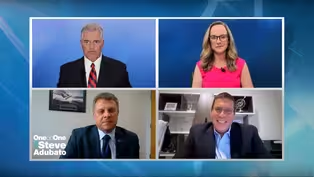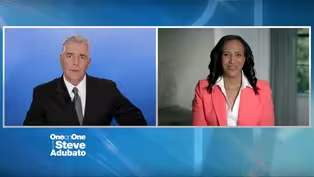One-on-One
Collegiate athletics, leadership, & athletes as role models.
Clip: Season 2024 Episode 2744 | 7m 35sVideo has Closed Captions
Collegiate athletics, leadership, & athletes as role models.
Steve Adubato is then joined by Bryan Felt, Director of Athletics and Recreational Services, Seton Hall Athletics, to talk about his commitment to collegiate athletics, leadership, and philanthropy, and how athletes are viewed as role models.
Problems playing video? | Closed Captioning Feedback
Problems playing video? | Closed Captioning Feedback
One-on-One is a local public television program presented by NJ PBS
One-on-One
Collegiate athletics, leadership, & athletes as role models.
Clip: Season 2024 Episode 2744 | 7m 35sVideo has Closed Captions
Steve Adubato is then joined by Bryan Felt, Director of Athletics and Recreational Services, Seton Hall Athletics, to talk about his commitment to collegiate athletics, leadership, and philanthropy, and how athletes are viewed as role models.
Problems playing video? | Closed Captioning Feedback
How to Watch One-on-One
One-on-One is available to stream on pbs.org and the free PBS App, available on iPhone, Apple TV, Android TV, Android smartphones, Amazon Fire TV, Amazon Fire Tablet, Roku, Samsung Smart TV, and Vizio.
Providing Support for PBS.org
Learn Moreabout PBS online sponsorship(upbeat music) - We're now joined by Bryan Felt, who's director of Athletics and Recreational Services at Seton Hall University Athletics.
Good to see you, Bryan.
- Good to see you, Steve.
- I have to disclose, as Bryan knows, I am a hardcore, along with thousands and thousands of others, a Seton Hall University basketball fan.
Also taught at the university a few years, and they're one of our higher ed partners.
Let me ask you this, Bryan, right out of the box.
- Yeah.
- An exciting time in college athletics, but also a very uncertain time as we do this program with decisions being made by the NCA, out of court settlements, NIL.
- Right.
- The transfer portal.
What, is it chaotic, exciting, what?
- It's a mixed bag.
I think the problem is we've got more questions than we have answers, right?
And you always, you know, you start somewhere.
That's where we are right now.
There's a lot to be determined.
Certainly we've seen a lot of the news in the last, you know, week.
We were together actually, the Big East athletic directors in our annual retreat meetings in Florida when all of this was unfolding with the house NCA case.
So there's a lot to be unpacked here.
There's a lot to still come, I think in the next six months as this case, as this, you know, this settlement kind of folds and comes unfolded.
So yeah, it's exciting in a sense because we know there's change.
I personally wanted to always, I invite change.
I love change.
I think we all, you know, it's, that brings excitement, but that brings also concern and it brings questions.
You know, how's this gonna get done?
How's this gonna look?
How are we gonna do this?
You know, so there's a lot of that.
So it's a mixed bag.
- From a coaching perspective.
You have some great coaches at Seton Hall.
There's, and it's not just because I'm a fan.
There are great coaches in college sports, but to what degree, from your perspective, Bryan, has college coaching slash leadership changed if a player can only be there for a year and then leave, or you don't have enough money in this name, image, and likeness fund, right?
You and I have talked about that as well.
How much has it changed actually, the art of leading and coaching in college sports?
- Oh, I think in some aspects, it's some, in some specific sports, it's drastic.
You know, take your football and your basketball, which, you know, tend to be the two most high profile collegiate sports, primarily because they're popular and because they generate revenue.
Absolutely, you're right.
So I think in that case, those sports, being a coach at that level, it's a much different ballgame.
I mean, you've seen it, right?
We've seen the great coaches across, you know, the landscape of college basketball and football in the last several years, pick up and leave, you know?
It's just a different game in a sense now.
But that being said, there's a lot of great young coaches, as you have you pointed out.
We have, you know, several of them.
One of them specifically in men's basketball who, you know, hey, he's gonna adapt.
- Some of these so-called old school coaches or coaches at an old school style discipline, in your face, telling you some really hard truths.
The argument that some have is that with today's athletes, and I only use air quotes because I can't believe how people generalize.
Well, they're all the same.
No, they're not.
Question, do you believe that coaching slash leading with younger athletes today, young college athletes, is different because kids are different?
18, 19, 20 year olds are different.
Social media has made it different.
Our culture has made it different.
So you can't be that hard school coach, old school coach.
You've got to manage them, those players differently, or they're gonna leave.
- Yeah, I think a lot's generational, I think certainly times have changed.
Young people have changed, but so have, you know, I think it's all relative.
I do believe that, yes, to your point, yes, there is changes in the generational kind of aspect of the whole thing that you have to adapt to.
But I've seen coaches just have to, I think the big word I use with our coaches, you just have to have balance.
And that's the the key thing.
You know, you have to balance.
Yeah, you could be tough and you could really get the work.
You know, your work ethic could be one that you're just driving.
That's, a lot of our student athletes want that.
They wanna be challenged.
They wanna work hard.
If you're gonna be an athlete at this level, you've gotta put in the work.
So you've gotta be, you know, you've gotta be pushed a little bit.
But at the same time, there's balance.
Because I think this is today a kinder generation and especially with everything that they've seen in terms of DE&I and mental health.
- Sure.
- You have to be able to balance it, understanding that aspect too.
And I think if you have that balance, you can still be the kind of coach you wanna be.
You just have to bring other aspects into it.
- Before I let you go, you mentioned the mental health piece.
- Yeah.
- We're taping this conversation after the tragedy of a very talented 30-year-old player on the PGA tour, committing suicide literally days after.
One of the top players in the ladies professional golf tour.
As we literally, as we're doing this program, very young, very talented, said the pressure has been too much for her.
Talked about her mental health.
Question, to what degree do you believe that the stigma around mental health has changed significantly, Bryan, to the point where most talented, effective, successful college athletes, young athletes can acknowledge I'm struggling, without being seen as weak?
- Yeah, I think a hundred percent.
It's so critically important to what we do here at Seton Hall every day with our athletes.
We provide them mental health, you know, training and necessary tools they need to be able to cope with the things that they have to, they're challenged to deal with.
And student athletes deal with a lot.
I mean, their schedule's not like a normal student in college, you know, between practice and classes and travel and competitions.
There's a lot to balance.
And you're seeing it with these professional athletes, it's still a lot.
And I think we talk about it more.
And I think that's the good thing.
I think it's healthy to talk about it more.
I think it's healthy to acknowledge it and to be able to let people know that we're there to help.
So yeah, I think it's a hundred percent very, very real and very, very critical to our success in the athletic department.
- Tough stuff.
Well beyond the X's and O's of sports.
This you've been listening to and watching Bryan Felt, Director of Athletics and Recreational services, Seton Hall Athletics at Seton Hall University.
I'm Steve Adubato.
Thank you so much for joining us.
We'll see you next time.
- [Narrator] One-On-One with Steve Adubato is a production of the Caucus Educational Corporation.
Celebrating 30 years in public broadcasting.
Funding has been provided by NJM Insurance Group.
RWJBarnabas Health.
Let’s be healthy together.
New Jersey Sharing Network.
The Turrell Fund, a foundation serving children.
The Russell Berrie Foundation.
IBEW Local 102.
The Port Authority of New York and New Jersey.
Horizon Blue Cross Blue Shield of New Jersey.
And by The Fidelco Group.
Promotional support provided by Northjersey.com and Local IQ.
And by New Jersey Globe.
- If you register as an organ donor, you have the potential of saving up to eight lives.
- My neighbor passed away.
His eyes were actually donated and that person now can see.
- Not only can you save a life, but if something should happen to me and I'm no longer here, I know that in some small part I'll live on in someone else.
- Say yes, save lives.
- Say yes, save lives.
- Say yes, save lives.
- Be an organ and tissue donor.
Anthony Russo, Michael Shapiro talk leadership & the media
Video has Closed Captions
Clip: S2024 Ep2744 | 11m 52s | Anthony Russo, Michael Shapiro talk leadership & the media (11m 52s)
Investing in partnerships & improving quality care at Johnson & Johnson
Video has Closed Captions
Clip: S2024 Ep2744 | 8m 25s | Investing in partnerships & improving quality care at Johnson & Johnson (8m 25s)
Providing Support for PBS.org
Learn Moreabout PBS online sponsorship
- News and Public Affairs

Top journalists deliver compelling original analysis of the hour's headlines.

- News and Public Affairs

FRONTLINE is investigative journalism that questions, explains and changes our world.












Support for PBS provided by:
One-on-One is a local public television program presented by NJ PBS

